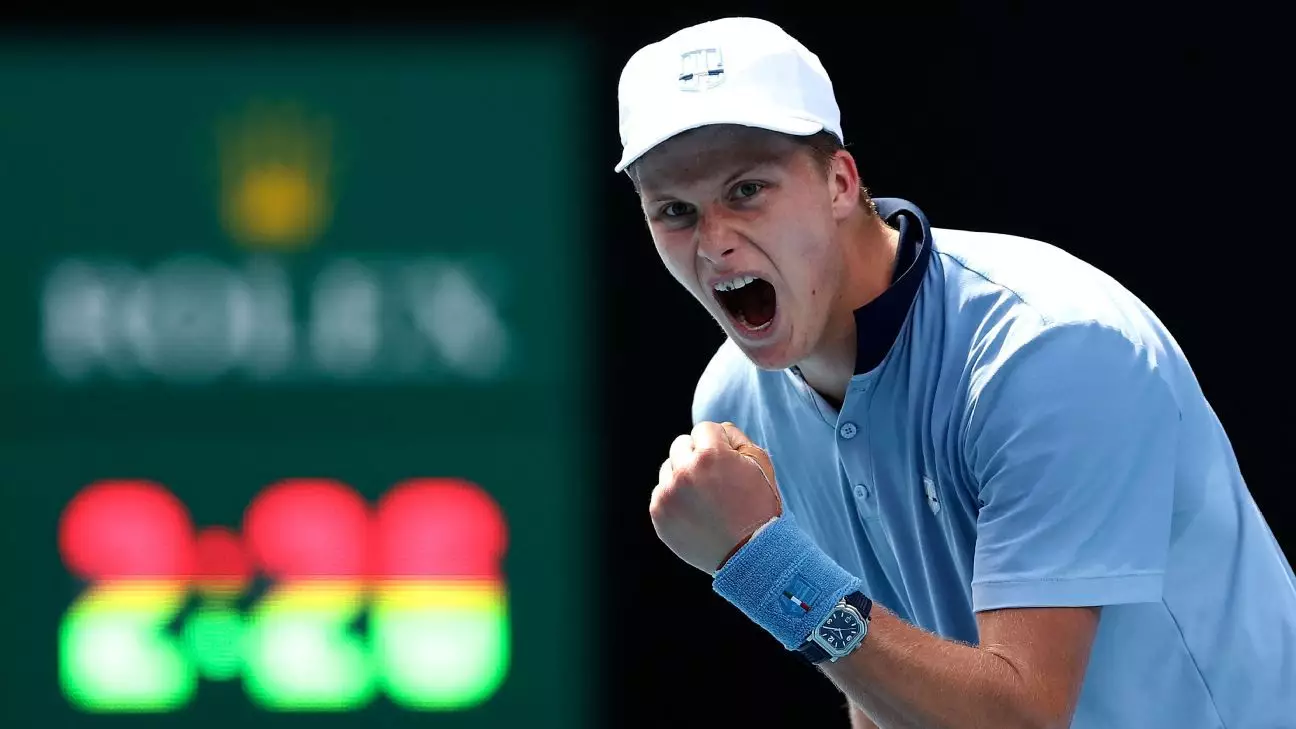Jenson Brooksby, a once-promising American tennis star, has faced a tumultuous journey over the past few years, marked by medical setbacks, personal revelations, and professional struggles. Initially achieving a ranking of No. 33 at just 21 years old, Brooksby found himself sidelined from the sport he cherished for nearly two full years. This period of absence not only tested his physical endurance but also impacted his mental health, causing him to confront feelings of depression that were compounded by the weight of unfulfilled expectations. As he prepares for his return to the tennis circuit at the Australian Open in January, Brooksby’s story serves as an inspiring testament to resilience and self-acceptance amid adversity.
Facing the Challenges of Autism
A particularly significant aspect of Brooksby’s journey is his experience with autism spectrum disorder (ASD). Recently speaking publicly about his diagnosis for the first time, he has expressed a desire to shed light on the impact of autism on his life and career in tennis. Growing up, Brooksby described spending an extensive amount of time—approximately 40 hours a week—with therapists to develop his communication and social skills. This early support laid the groundwork for his eventual success but also illuminated the unique challenges he faced, as he was nonverbal until the age of four.
Brooksby views his autism as a dual-edged sword; while it has granted him extraordinary focus during high-pressure moments on the court, it has also rendered him prone to emotional outbursts when faced with frustration. These reactions, according to his athletic trainer Paul Kinney, require careful monitoring to ensure they do not disrupt his competitive performance. Drawing on his early experiences with therapy and support, Brooksby has transformed what once felt like a setback into a strength, actively embracing discussions surrounding his neurodiversity.
The world of professional tennis is cutthroat. For Brooksby, it has been a landscape filled with both promise and peril. Following his short-lived ascent in 2022, a cascade of injuries led to surgeries on both wrists, undermining his physical readiness to compete. As if that weren’t enough, a suspension by the International Tennis Integrity Agency (ITIA) for missed drug tests forced him to step back even further from the sport. His original 18-month ban, rooted in a miscommunication during a testing attempt, exemplifies the often-complex relationship between athletes and regulatory bodies. Thankfully, an appeal led to the reduction of this suspension, allowing Brooksby to see a light at the end of the tunnel, yet the weight of these combined challenges continues to loom large.
With plans to return to competitive play at lower-tier Challenger events before taking on the Australian Open, Brooksby’s ambitions still burn bright. His coaches, Eric Nunez and Rhyne Williams, alongside Kinney, have been instrumental in helping him rebuild not just his tennis skills but also his physical wellbeing. There is an underlying belief among his team that Brooksby has the potential to reclaim a top ranking in tennis, should he successfully navigate the obstacles that lie ahead.
More than just a tennis player, Jenson Brooksby is a young man determined to communicate his full self to the world. By coming forward about his autism, he hopes to influence how others perceive people with similar diagnoses. “I just want people to know me for who I am fully, and that’s just another part of me,” he said, acknowledging the importance of authenticity in his life. This commitment to vulnerability is both refreshing and crucial, especially in a society that often stigmatizes those who are different.
Brooksby’s journey is not merely about striving for tennis glory; it is also a quest for personal growth and understanding. As he prepares for his return to the game, he recognizes that it is equally about his mental health and emotional wellbeing as it is about regaining his physical prowess on the court. He is not just aiming to return to form; he is forging a new identity that fully encompasses both his past challenges and his aspirations.
As Brooksby stands at the brink of his comeback, he embodies the spirit of resilience characterized by a refusal to be defined solely by setbacks or diagnoses. His story resonates with compassion and determination, illuminating the experience of many athletes facing their demons inside and outside the arena. With plans to return competitively soon, Brooksby is poised not only to reestablish his presence in the tennis world but also to drive important conversations around autism and mental health forward. His journey offers hope not only to aspiring athletes but to anyone navigating the complexities of life’s unpredictable challenges.


Leave a Reply